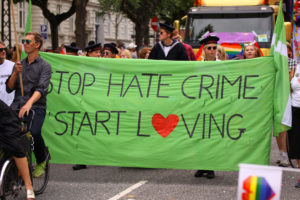An introduction to hate crimes and restorative justice
Hate crimes
Criminal acts motivated by bias or prejudice towards sexual orientation and/or gender identity fall into the current definition of “hate crimes”. Combating this specific type of crime has been adopted as a priority by national and transnational institutions and organizations due to its deep and multidimensional harm. Hate crimes affect the security of individuals, their communities, and society as a whole. In consequence, legislations across Europe have responded to hate crimes by increasing the punishment of offenders.
Lesbian, gay, bisexual and transgender (LGBT) people across the EU experience discrimination, harassment and violence in different areas of life. According to data from the second EU LGBTI Survey (2020), 11% of LGBTI respondents in the EU had been physically or sexually attacked in the five years before the survey because they are LGBTI, with trans (17 %) and intersex (22 %) respondents experiencing attacks at higher rates. Still, only one in five (21 %) incidents of physical or sexual violence was reported to any organisation, including the police (14 %). Similarly, findings from the LetsGoByTalking partners’ previous projects (Divercity, Come Forward and Call It Hate) have highlighted that LGBT people rarely report discrimination or violence to the police or other authorities, mainly due to their distrust in the complaint mechanisms and the judicial system. Further, the criminal process often generates secondary victimisation and does not have the restorative effects that victims need.
Our focus is on the victims’ rights, through the promotion of restorative justice across the EU, believing that this will help the juridical system to combat anti-LGBT hate crimes.
With this project, LetsGoByTalking, we would like to develop a victim-centred approach and contribute to the reparation of anti-LGBT hate crimes. Our focus is on the victims’ rights, through the promotion of restorative justice across the EU, believing that this will help the juridical system to combat anti-LGBT hate crimes.

11% of LGBTI respondents in the EU had been physically or sexually attacked in the five years before the survey because they are LGBTI
EU LGBTI Survey (2020)
Restorative justice
Restorative justice can be defined as any process which enables those harmed by crime, and those responsible for that harm, if they freely consent, to participate actively in the resolution of matters arising from the offence, through the help of a trained and impartial third party.
Restorative justice and restorative approaches provide an opportunity for victims to obtain reparation, feel safer and seek closure, but they also allow offenders to gain insight into the causes and effects of their behaviour and take responsibility in a meaningful way, whilst enabling communities to understand the underlying causes of crime.

Restorative justice and restorative approaches provide an opportunity for victims to obtain reparation
